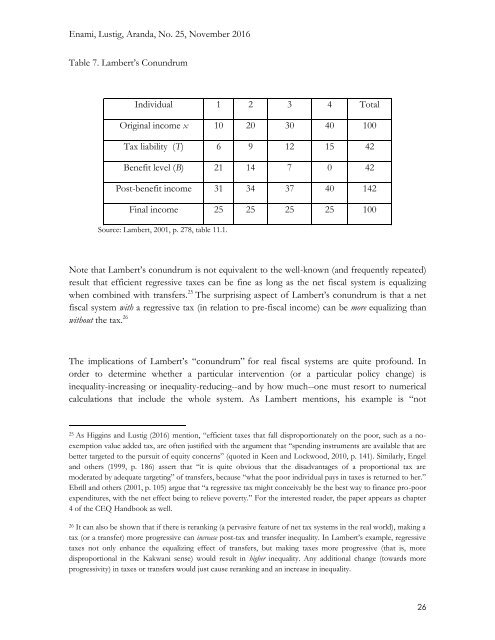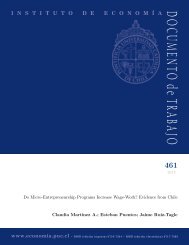IMPACT OF TAXES AND TRANSFERS
n?u=RePEc:tul:ceqwps:25&r=lam
n?u=RePEc:tul:ceqwps:25&r=lam
Create successful ePaper yourself
Turn your PDF publications into a flip-book with our unique Google optimized e-Paper software.
Enami, Lustig, Aranda, No. 25, November 2016<br />
Table 7. Lambert’s Conundrum<br />
Individual 1 2 3 4 Total<br />
Original income x 10 20 30 40 100<br />
Tax liability (T) 6 9 12 15 42<br />
Benefit level (B) 21 14 7 0 42<br />
Post-benefit income 31 34 37 40 142<br />
Final income 25 25 25 25 100<br />
Source: Lambert, 2001, p. 278, table 11.1.<br />
Note that Lambert’s conundrum is not equivalent to the well-known (and frequently repeated)<br />
result that efficient regressive taxes can be fine as long as the net fiscal system is equalizing<br />
when combined with transfers. 25 The surprising aspect of Lambert’s conundrum is that a net<br />
fiscal system with a regressive tax (in relation to pre-fiscal income) can be more equalizing than<br />
without the tax. 26<br />
The implications of Lambert’s “conundrum” for real fiscal systems are quite profound. In<br />
order to determine whether a particular intervention (or a particular policy change) is<br />
inequality-increasing or inequality-reducing--and by how much--one must resort to numerical<br />
calculations that include the whole system. As Lambert mentions, his example is “not<br />
25 As Higgins and Lustig (2016) mention, “efficient taxes that fall disproportionately on the poor, such as a noexemption<br />
value added tax, are often justified with the argument that “spending instruments are available that are<br />
better targeted to the pursuit of equity concerns” (quoted in Keen and Lockwood, 2010, p. 141). Similarly, Engel<br />
and others (1999, p. 186) assert that “it is quite obvious that the disadvantages of a proportional tax are<br />
moderated by adequate targeting” of transfers, because “what the poor individual pays in taxes is returned to her.”<br />
Ebrill and others (2001, p. 105) argue that “a regressive tax might conceivably be the best way to finance pro-poor<br />
expenditures, with the net effect being to relieve poverty.” For the interested reader, the paper appears as chapter<br />
4 of the CEQ Handbook as well.<br />
26 It can also be shown that if there is reranking (a pervasive feature of net tax systems in the real world), making a<br />
tax (or a transfer) more progressive can increase post-tax and transfer inequality. In Lambert’s example, regressive<br />
taxes not only enhance the equalizing effect of transfers, but making taxes more progressive (that is, more<br />
disproportional in the Kakwani sense) would result in higher inequality. Any additional change (towards more<br />
progressivity) in taxes or transfers would just cause reranking and an increase in inequality.<br />
26



